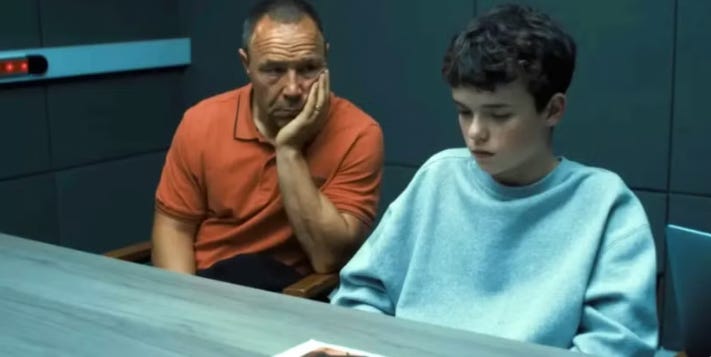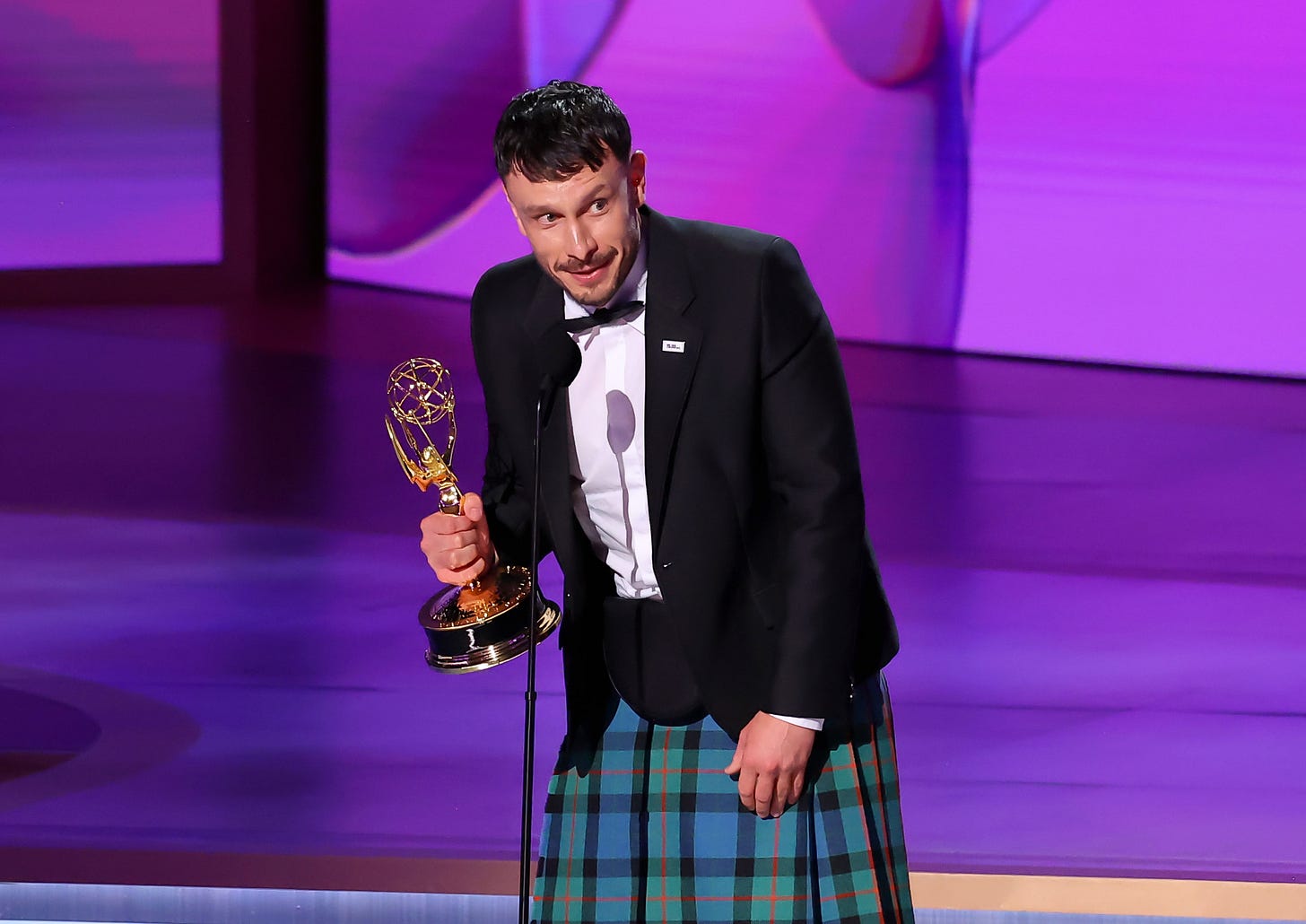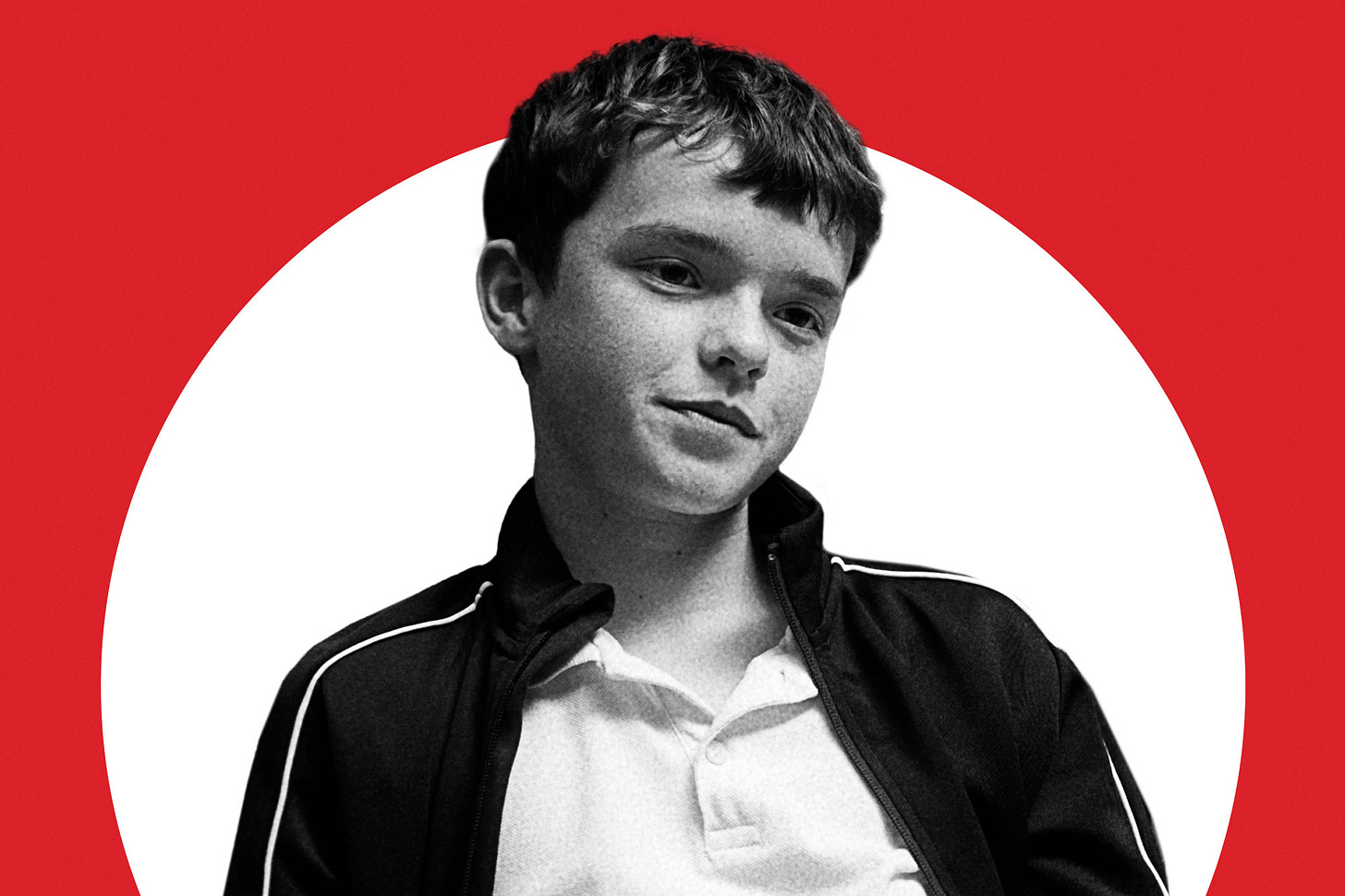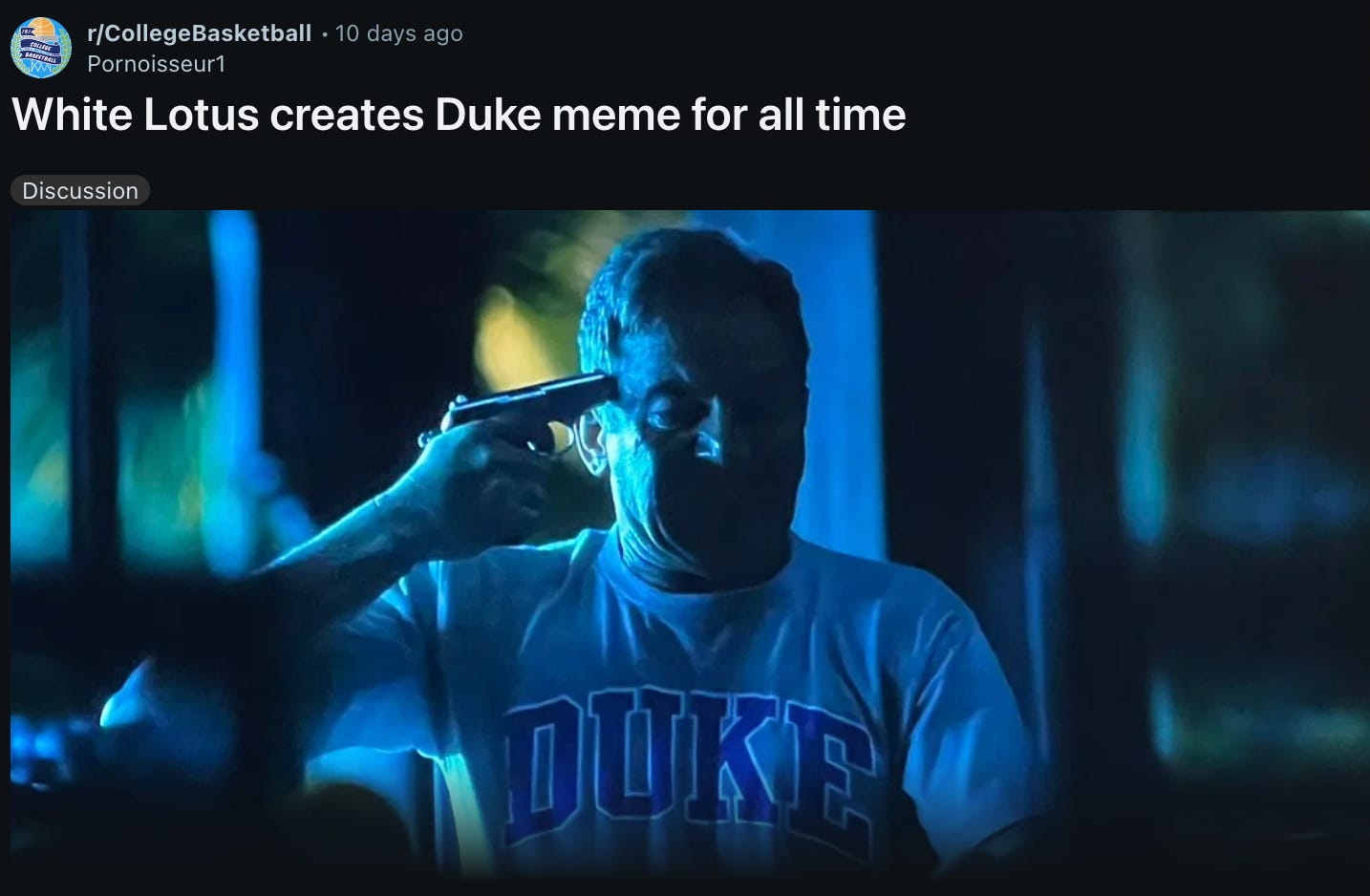The 'Adolescence' Moment
The chilling series sets Netflix records, and, of course, makes Andrew Tate really mad. Plus: The Academy’s weak on ‘No Other Land’, and who’ll play Hegseth
When I launched this newsletter nearly a year ago — the traditional one-year anniversary gift is paper, BTW — one of the first stories I covered was the explosive arrival of Baby Reindeer, the searing Netflix show that has spent the past year winning basically every award available to it.
At the time it seemed like even the awards team at Netflix was surprised by how strongly the show connected — it seemed like kind of a scramble to get creator-star Richard Gadd on the typical FYC circuit last spring and summer. But the streamer wasn’t about to let itself be caught flat-footed again with its latest show to seize the zeitgeist.
“This limited series is truly special” one Netflix insider nudged me just a few days before the four episodes of Adolescence dropped on the service. “The last series I was this proud of was Baby Reindeer.” Formally ambitious, emotionally devastating and very, very British, Adolescence would probably have a Baby Reindeer vibe even if it weren’t also a Netflix hit. But with its focus on an urgent social issue, Adolescence has the potential to do something very few TV shows accomplish in this fractured media age: Create real-world change.
In today’s newsletter I’ll get into Adolescence and the buzz around it — with 66.3 million views so far, Netflix says, it’s the streamer’s most-watched limited series and most-watched U.K. title ever through its first two weeks. But first there’s an even more profound real-world story playing out among the film Academy, critics groups around and the filmmakers of this year’s best documentary feature winner No Other Land.
Academy Sidesteps Politics, Takes Critics’ Fire

As I reported last week, No Other Land was at the center of a skirmish between the mayor of Miami Beach and the local independent theater, O Cinema, that insisted on its First Amendment rights to show the film. Days after the mayor dropped his campaign, a much more dire situation emerged: Hamdan Ballal, one of the Palestinian co-directors of No Other Land, was detained by Israeli authorities after an attack on his village in the West Bank by Israeli settlers and, according to his Israeli co-director Yuval Abraham, beaten and held overnight.
Before Ballal was released, Abraham reached out to the Academy of Motion Picture Arts and Sciences, which had hosted Ballal on its stage weeks earlier, to put out a statement in support of the Oscar-winning filmmaker. The Academy declined, and — in a fiery statement on X — Abraham accused the group of remaining “silent when a filmmaker they honored, living under Israeli occupation, needed them the most.” The Academy finally put out a statement on Wednesday but did not mention Ballal’s name or take any stance on his specific situation.
“The Academy condemns harming or suppressing artists for their work or their viewpoints,” read the statement, co-signed by CEO Bill Kramer and President Janet Yang. “The Academy represents close to 11,000 global members with many unique viewpoints. We are, however, united in a shared belief in the importance of storytelling, in the value of empathy, and in the role of film as a catalyst.”
The statement has been decried on social media by a number of well-connected awards writers for being insufficient, or even worse than saying nothing at all. Meanwhile, the National Society of Film Critics, together with the major critics groups in New York, Los Angeles and Boston, released their own statement Thursday, specifically linking their support of No Other Land to a moral imperative to support Ballal. “As critics representing four of the numerous organizations that honored No Other Land as the best documentary of 2024, we are infuriated that a filmmaker’s brave and principled advocacy has made him even more of a target in a community where Palestinians already exist under continual threat of displacement and violence.”
Tensions around Israel and Palestine have risen to a new high within the film community. Not long after that joint statement from the critics groups, a different, unaffiliated group of critics published an open letter to Variety, criticizing the publication’s Snow White post-mortem and its attention to star Rachel Zegler’s pro-Palestinian views. The Academy, which usually — and successfully — positions itself as a central meeting point for the many fractious elements of the film community, will likely continue trying to stay out of this thorny controversy. But with the pushback against its statement ongoing as of this writing, it’s unclear how long the group’s careful neutrality can hold.
Now, Boys to Men
So they’ve got things at least a little more figured out in the U.K., right? As far as we know their military leaders aren’t accidentally texting war plans to journalists, but they’ve got plenty of their own problems, including a “crisis of masculinity” that’s been expertly, heartbreakingly detailed in the hit new Netflix miniseries Adolescence. The show has been a success around the world, but so impactful in the U.K., where it was produced, that Prime Minister Keir Starmer addressed it in an interview, sharing that he has watched it with his teenage children. “A lot of parents and people who work with young people at school and elsewhere recognize we may have a problem with boys and young men that we need to address,” he said on a U.K. radio show. “I personally take it very seriously.”
Inspired by a series of real crimes in the U.K., Adolescence follows a community rocked by the stabbing of a teenage girl, centering on the 13-year-old boy Jamie (Owen Cooper) who killed her, seemingly radicalized by misogynistic content online. Co-creators Jack Thorne and Stephen Graham, who also plays a key role as Jamie’s father, have been open about the show’s off-screen implications and their desire to tackle a disturbing societal issue.
“One of our aims was to ask, ‘What is happening to our young men these days, and what are the pressures they face from their peers, from the internet and from social media?’ Graham told Netflix’s in-house fan site Tudum. “There was an incident where a young boy [allegedly] stabbed a girl. It shocked me. And then it happened again, and it happened again, and it happened again. I really just wanted to shine a light on it, and ask, ‘Why is this happening today? What’s going on? How have we come to this?’”

Graham and Thorne have been invited to meet with British politicians concerned about online safety, and others have called for Adolescence to be shown in schools. There is, inevitably, also a backlash brewing, along lines that probably feel exhaustingly familiar to American audiences. Elon Musk reposted a tweet accusing the show of deliberately switching the race of the accused murderer, even though Adolescence is inspired by multiple real-life crimes in different communities across the U.K. “MAGA Melts Down!” proclaimed The Daily Beast.
As my Ankler colleague Manori Ravindran explained on our Emmy kick-off episode of the Prestige Junkie podcast earlier this week, Adolescence isn’t the first show to get U.K. audiences and politicians to take action. Last year’s ITV series Mr. Bates vs. The Post Office dramatized a real-life scandal involving British postal workers and led to actual legislation to impact the people affected. Manori tells me it’s unlikely Adolescence can lead quite so directly to lawmaking, but its impact is still substantial.
“Adolescence seems to only be going from strength to strength,” Manori told me in an e-mail. “What’s interesting is that the show obviously feels British and many in the U.K. watching it will see their lives reflected on screen, but its themes are so universal that it lends itself organically to global audiences and viewership.”
Manori notes that Adolescence is not made by the BBC, a little surprising “given it’s basically a perfect fit for the Beeb’s public service remit,” she tells me. “It’s likely that they couldn’t afford the production values that Netflix can, which is certainly a sad situation for the BBC to be in.”
A sad situation for the BBC, but a real coup for Netflix — as well as the international viewers who are as taken with Adolescence’s social realism as we were with the lurid true-life details of Baby Reindeer this time last year.
True to Life

When Baby Reindeer took audiences by storm last April, it wasn’t just the performances from Gadd and Jessica Gunning that kept everyone talking. Internet sleuths, trained well by years of true crime podcasts and TV shows, tried their damnedest to find the “real Martha,” the stalker who inspired Gadd to write the show. Eventually Fiona Harvey, a Scottish lawyer who matches many details of the Baby Reindeer character, stepped forward to dispute Gadd’s version of the story and particularly the title card claiming “this is a true story” at the beginning of each episode. Her $170 million defamation case against Netflix is ongoing.
But Baby Reindeer also inspired a lot of non-litigious conversations about everything from the lack of conversation around sexual violence in the queer community to “how amateur sleuths ruined pop culture.” You know your show has made an impact when every pundit can find their own angle on it, and the issues raised by Baby Reindeer eventually managed to overshadow the saga of Harvey’s lawsuit. By the time Baby Reindeer virtually swept the limited series Emmy category in September, it was a pretty pure victory lap.
There may be more backlash to come for Adolescence, though as a work of fiction (no “true story” claims) it should at least be able to get the internet sleuths off its back. If right-wing trolls continue to be the only ones getting mad about it, that’s even better. (Andrew Tate, who is namechecked in the series as a toxic manosphere influence, has called his depiction “unjust,” and I’m guessing that’s not the last we’ll hear from him).
Meanwhile, the show’s real secret weapon in the Emmy race may be not its topicality but rather its talent — specifically Cooper, 15, whose truly phenomenal performance ought to make him a runaway favorite in whatever Emmy category he lands in. His character may be terrifying, but his press appearances are getting headlines like “heartwarming” and “must-watch,” particularly thanks to this clip of him and his co-star Erin Doherty revisiting his audition for the show.
Doherty and Cooper are the focus of the show’s standout third episode, which like every episode of Adolescence is filmed in a sweeping single take. Doherty plays a psychologist trying to assess Jamie’s “understanding” before he heads to trial, both establishing a rapport with him and provoking terrifying anger over the episode’s hour. It’s a dazzling feat of acting that also reveals for the first time how a seemingly sweet, well-raised kid like Jamie could be capable of murder.
Netflix hasn’t yet confirmed which categories the actors of Adolescence will be campaigned in at the Emmys, but despite a handful of other strong limited series contenders that I wrote about earlier this week, it’s likely to barnstorm the category just like Baby Reindeer before it. If it manages to stir even more off-screen conversation and change in the process, so much the better.
Closing Credits
Any bets on who will play Pete Hegseth in the inevitable Saturday Night Live take on Signalgate? This weekend’s episode is hosted by Mikey Madison, who would be an unconventional but highly unlikely choice, though musical guest Morgan Wallen could pull it off with the right wig. If it’s not a cast member who gets the job, whichever celebrity guest takes it on might find Emmy calling — Matt Damon, Robert de Niro, Brad Pitt and of course Alec Baldwin have all earned Emmy nominations for spoofing various members of Trumpworld.
Congratulations to Boulder, Colorado, the new home of the Sundance Film Festival, as announced on Thursday. The search for a new alternative to Park City had been narrowed down to Boulder, Cincinnati, and Salt Lake City (which has hosted certain fest events each year), and given Ohio’s efforts to pass anti-trans bills, Cincinnati — as lovely as I’m sure it is — seemed likely an unlikely choice. Sundance won’t move to Boulder until 2027, so there’s one more year to enjoy the snow on the Utah side of the Rockies.
As a proud neighbor of Duke University, I hereby volunteer to drive over and teach its administrators about the Streisand Effect, which is almost certainly what will happen now that the university’s VP for communications has told Bloomberg how HBO’s The White Lotus “simply goes too far” in its use of Duke’s logo. True, the image of Jason Isaacs’ troubled businessman character holding a gun to his head while wearing a Duke T-shirt is probably not what the esteemed uni would want in an ideal world, but it will undeniably goose merch sales to UNC students eager to recreate a meme come Halloween.





